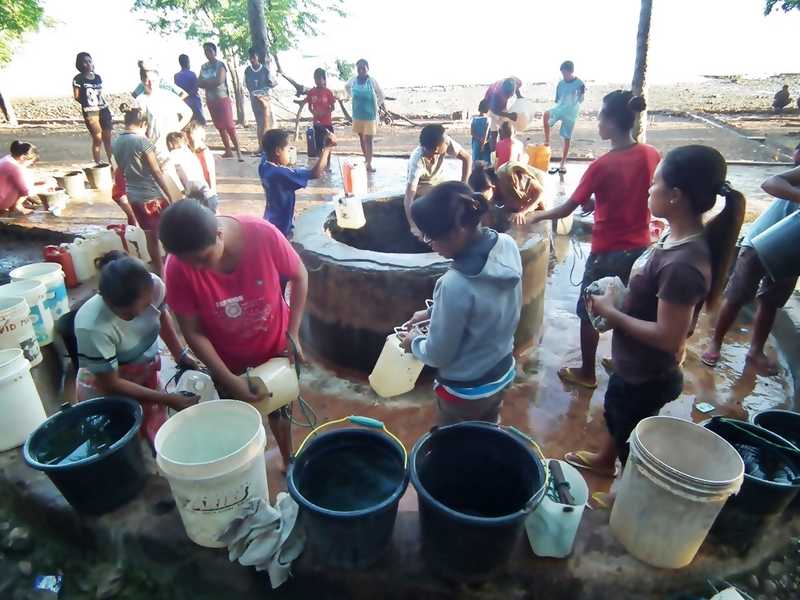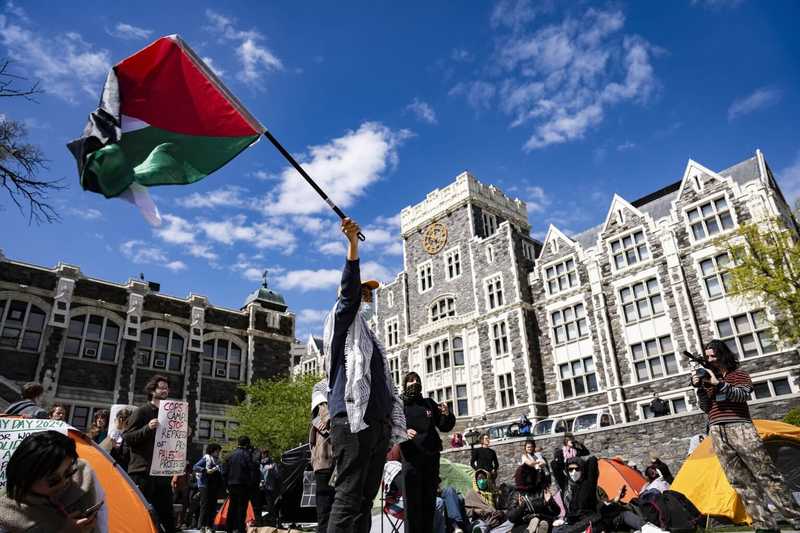
First, it is a fact that, during the neoliberal period, public health systems were not a priority for most governments in the world, regardless of political leaning or ideology. For example, China, although it has had the highest economic growth rate over the last decades, has raced to build hospitals; in Europe and the United States, the scenes of seriously ill people waiting to be treated in intensive care units have been heartbreaking; and in our country, it has become clear that not only do we lack hospital beds, ventilators and personal protective equipment for our health workers but worse, we have a shortage of medical personnel and, above all, medical specialists. We should recall that during the neoliberal period, in their zeal to privatize education, governments didn't adequately fund public universities, which opted to reject applicants under the guise of saying that they hadn't passed the entrance exam. As a result, in a country of poor people, many youths who couldn't pay private school tuition were unable to study. Not only was the right to education denied, but it also left us without enough doctors and nurses to meet the nation's health needs.
But perhaps the most glaring area of indifference or irresponsibility of past governments that has been exposed by the coronavirus is the decades of neglect of chronic diseases such as hypertension, diabetes, obesity and kidney problems, which have increased as a result of a diet of industrialized food, "junk food", and a lack of education about nutrition and the need for physical exercise and sports activities.
This is further proof that the neoliberal model only focuses on acquiring material goods and on economic growth. It doesn't care about people’s wellbeing or the damage this approach does to their health or to the environment.
In our country, the pandemic has shown that the people who have these chronic diseases are the most affected. In fact, this group has suffered more than the elderly. According to the data available so far, 55% of those who have died from the virus had hypertension, diabetes or obesity.
Another problem that has come to light is the scant solidarity that exists in the world when it comes to purchasing medical equipment and medicines. Speculation and profit seeking have reached shameful levels. A ventilator that cost about US$10,000 before COVID-19 is now sold for up to $100,000. Worse, because of the shortage, both governments and the companies that make these machines are stockpiling them. That is why, in the midst of this tragedy, I am glad that, so far, the pandemic has not affected the African continent with the same intensity as in other regions.
However, in addition to the enormous damage that COVID-19 has caused to public health, including the very terrible loss of life, it has also caused the collapse of the global economy. Suffice it to say that, according to the forecasts, almost every country's growth will fall by about seven percent. Only India and China will grow by 1.6 and 1.2 percent, respectively. In China’s case, this is unprecedented after more than 40 consecutive years of material progress.
Of course, the coronavirus itself is not responsible for this economic catastrophe. The pandemic has only exposed the failure of the neoliberal model in the world. Add to this, at the same time, the failure of the world's oil-producing countries to reach an agreement on how to stop flooding the market, causing oil prices to plummet and complicating the economic and financial situation even further. In other words, the vulnerability of the global economy has been made apparent, and any natural disaster, epidemic or conflict can lead to disaster. In short, the global pandemic has come to show us that the neoliberal model is in its final stages.
Therefore, it's time to create new forms of political, economic and social coexistence, putting aside, once and for all, the commercial, individualistic and unsupportive approach that has predominated for the last four decades. The coronavirus has reminded us that it is better to care for the elderly in our homes than in nursing homes, however comfortable they may be. Nothing can take the place of love. This also means that we have to reconsider the parameters that have been used to measure the wellbeing and development of peoples and nations. We have to change the focus of global reconstruction. The premise must be that progress without justice is a step backwards and that modernity must be forged from below and for everyone.
Perhaps these underdogs, those who are "below" — marginalized and disdained by the technocratic mentality — have something to teach us; perhaps the models of communitarian coexistence that have been seen as a problem by the neoliberal ideology of "modernity" are actually full of solutions.
I mentioned Africa, but we also have to turn our gaze to the vast rural regions of Asia and Latin America where the pandemic has penetrated to a much lesser degree. In theory, the spread of the new virus in these areas would have to be especially catastrophic given the inexistence or precariousness of the healthcare infrastructure, basic services, communications and telecommunications there.
But we have to ask ourselves if these deficiencies haven't been compensated for to some extent during the pandemic by the existence of communitarian cultures with deeply rooted support systems, relative food self-sufficiency and forms of social organization that continue to challenge the uniforming and atomizing integration of the macroeconomy.
Until now, the unstoppable expansion of predatory neoliberalism has brought to this periphery exploitation, looting, environmental devastation, pathological eating habits, organized crime, social and family breakdown and a generalized loss of values, but there has been no interest in providing people with drinking water, electricity, schools, clinics, roads and telecommunications.
We must be able to envisage the enormous civilizing potential that the international community could gain from these regions if it entered into a pact with them to guarantee their collective and individual rights, hitherto denied in practice, and, in exchange, the communities could teach the rest of the world the foundations of the good life and remind them of the principles for living with and for others, which is the only way to successfully cope with the uncertainty of natural disasters and epidemics.
Returning to the realm of nations, we urgently need to cast aside the recipes always proposed by the international financial institutions that are supposedly meant to reverse the recurring crises but that in fact cause new cycles of wealth concentration, new spirals of corruption, increased inequality, wider social chasms between regions and between cities and the countryside and, ultimately, aggravate inequality, social disintegration, migration, marginalization and misery. This has been demonstrated, unfortunately, in several countries: in Mexico, as a result of the privatizations foisted upon the majority and the big fortunes that were rescued by the Fobaproa fund (1998); and the same happened in Argentina, where the recent attempt to reintroduce neoliberalism resulted in a brutal economic crisis translated into a brutal economic crisis not far from bankruptcy.
Some basic lessons:
- We must strengthen the public health systems, in the understanding that—just as with education and social security—health cannot simply be a commodity or a privilege but is rather an inherent right of all human beings. Therefore, resources allocated to these areas are not an expense but rather an investment in the most valuable and precious resource of any country: its people.
- We must urgently address the serious problem of chronic diseases which are, de facto, the pandemics that have caused the most deaths in the world. In other words, many more lose their lives because of heart attacks, obesity and diabetes than those who, tragically, will die from the coronavirus. It's true that chronic diseases are largely hereditary, but they are caused or exacerbated by eating industrialized food and by poor nutritional habits. We urgently need a global movement that promotes health education and prevention, nutritional guidance, physical education and sports.
- We need a more caring world in order to strengthen universal brotherhood, and we should start by putting an end to the stockpiling of food, medicine and hospital equipment. For all health-related matters, monopolies and for-profits must be strictly regulated, and the sales of medicines and medical equipment must be controlled. There must be a guarantee that no one on the planet is deprived of medicines, medical care or hospital services due to the lack of financial resources or because market forces put these benefits out of reach.
- The United Nations and the World Health Organization (WHO) should immediately call on the governments and scientists of the world to create vaccines against the coronavirus and other ills.
- States must stop using a model that creates wealth without wellbeing and must fulfill their responsibility to society by ensuring the basic and universal rights of health, food, education, work, housing, culture and sports. It is the responsibility of the State to reduce social inequalities. We cannot continue to leave social justice off of the governments' agenda. It is not fair play to use the State to defend private interests and then to minimize its role when it comes to benefiting the majority. It is neither lawful nor ethical to defend the power of the State to rescue bankrupt companies and financial institutions but to consider it a burden when it comes to improving the wellbeing of the most disadvantaged. Enough hypocrisy.
- Cultural, moral, and spiritual values must be strengthened and the family should be recognized as an essential social security institution.
- International financial and economic organizations such as the World Bank (WB), International Monetary Fund (IMF), Inter-American Development Bank (IDB), the Organization for Economic Cooperation and Development (OECD), the Group of 20 (G-20) and others should become true promoters of cooperation for the development and wellbeing of people and nations.
- The ideas and actions of the governments of the world should be guided more by humanitarian principles than by economic or personal interests, or by the interests of groups or powers, regardless of how legitimate they may be. We must say no to violence or wars of any sort; no to the predominance of pressure groups and to vested interests; and no to inequality, racism, dictatorships; and say yes to peace, justice, equality, freedom, democracy and wellbeing.
The ongoing pandemic will leave us with hundreds of thousands of irreparable absences and a severely disrupted and diminished economy. In many ways, we must apply ourselves to the task of rebuilding the world. I hope that we can build on a new foundation of proposals that allow us to take advantage of the good that this crisis has left us: the confirmation and certainty that, for both individuals and nations, health care must be a collective and solidary task; if we say "each man for himself," no one will be saved — or almost no one. We are gregarious beings by nature, and all people and all nations belong to the same family: humanity.
Photo: Eneas de Troya






